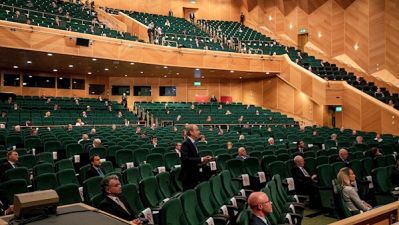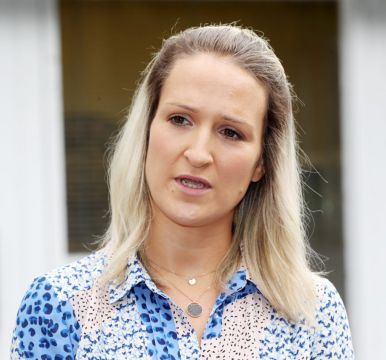The Government acted “appropriately” throughout the Seamus Woulfe appointment process, Justice Minister Helen McEntee has said.
The need to ensure and protect the principle of judicial independence was a significant factor in the consultations process, she added.
The Supreme Court judge attended the “Golfgate” event in Clifden, Co Galway, in August when members of the Oireachtas’ golf society gathered for a dinner organised in breach of Covid-19 rules.
He refused to resign over his handling of the incident, despite a call from chief justice Frank Clarke to quit.
In a statement to the Dáil outlining the appointment process of the Supreme Court judge, Ms McEntee urged her Government colleagues to be “mindful” of responsibilities to uphold “the independence and integrity of the judiciary”.
Impeachment
It comes as a number of TDs are bringing a motion of impeachment against Mr Woulfe.
“It is incumbent on all of us to uphold the independence and integrity of the Judiciary, and to not do or say anything which could undermine the courts, or any sitting judge or indeed undermine the separation of powers,” she said.
Ms McEntee said: “This Government has acted appropriately at all times through the current process, which we stand over, having adhered to the process and to the law.”
Former attorney general Mr Justice Woulfe’s name was the only one she put forward to the Taoiseach, Tánaiste and Green Party leader for approval in the summer, only three weeks after being appointed as minister.
He was proposed to the minister by the independent Judicial Appointments Advisory Board (JAAB), which assessed him as being suitable for the job, while the three sitting judges registered their expressions of interest through the attorney general’s office.
That is exactly what has happened in this case
Ms McEntee told the Dáil: “The practice in relation to appointments or nominations to positions made by Government is that only one name is brought to Cabinet by the proposing minister.
“I believe that this practice is particularly important in relation to judicial appointments, as an open debate on the merits or otherwise of sitting judges, as well as others who have been nominated by the JAAB, would amount to a complete politicisation of the judicial appointments process, when one of the very great strengths of the Irish judiciary has been its non-political character and independence, unlike what we see in many other countries.
“It is a solemn duty on the part of the minister for justice to propose to Cabinet someone who, in the opinion of the minister, is the best person for the particular judicial vacancy.
“The Government then decides. That is exactly what has happened in this case.”
Eeny, meeny, miny, moe
In response to the Minister's statement, opposition parties have said Ms McEntee's explanation is not credible.
Sinn Féin's Matt Carthy said Ms McEntee had still not explained how she chose Mr Woulfe.
“The reason why the Minister can’t properly explain how she whittled four names down to one is because she didn’t," he said.
"It wasn’t even as crass as eeny, meeny, miny, moe. This was eeny, eeny, eeny, Woulfe.”
Ms McEntee has said she intends to bring a bill forward to provide for the establishment of a new Commission to replace the JAAB.

"This Government has never believed that the judicial appointments process currently in place is as good as it should be," she said.
"And that is why we built into our Programme for Government that we would bring new legislation to reform the process very quickly.
"It seems that we can all agree in this House that there is significant room for improvement in the current system. I am determined to lead that reform and quickly."







